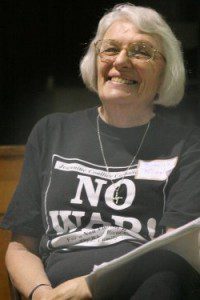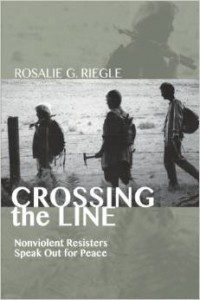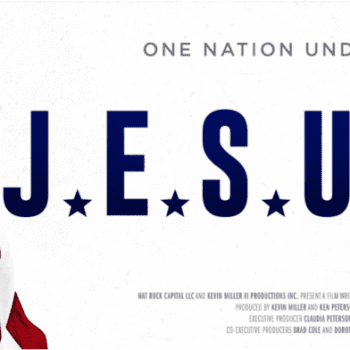The following book review is by Lindsey Paris-Lopez, Editor in Chief of the Raven Foundation.
Introduction:
“Peaceful, law-abiding…” In clichéd phrases, the latter adjective follows after the former automatically, as if the one were equivalent to the other. Any nation will condition its citizens to believe that the law is a benevolent instrument serving the protection and prosperity of the people. But with violence at the root of civilization and so deeply woven into national structures, fundamental aspects of national law protect some by threatening others and keep order by keeping systems of poverty and oppression in place. Nations that allocate significant portions of their budgets for “defense” do so at the expense of their most vulnerable, as well as threaten the peace of citizens of other nations. For all the good that many laws do, laws that protect the policies and weapons that keep the gears of violence turning, upon which the world revolves toward its own destruction, must be challenged for the sake of peace and prosperity, sometimes from beyond their boarders. In order to build lasting peace and promote the welfare and dignity of every human being, sometimes it is necessary to “cross the line.”
Rosalie Riegle’s powerful oral history, Crossing The Line, is a compelling counter-narrative to the myth of benevolent violence that subtly underlies national structures. History books divide time into periods of war; lines on international maps divide space into zones that armies will fight to protect; the praises of generals and commanders-in-chief are sung, and the peacemakers, whom Jesus calls “blessed,” are all too often overlooked. In a world structured on violence, it is necessary for peacemakers to be prophetic, counter-cultural voices, willing to break violent laws with nonviolent resistance and trade comfortable complacency for the consequences of witness. Dr. Riegle found and interviewed 173 of these modern-day prophets in a 2-volume collection of witness narratives. While the companion piece to this volume, Doing Time for Peace, has a familial focus, Crossing the Line has a historical focus, tracing the peace movement from World War II onward through the stories of those who lived it. The narrators are diverse and their experiences vary widely, but they are united by courage and integrity. Many are priests and Catholic Workers who follow the Prince of Peace by disturbing the peace of the status quo that justifies, glorifies and necessitates war. Some are Protestant, some Jewish, some are agnostic or atheist, but all have faith in humanity, faith in a future beyond our self-destructive tendencies. Risking and accepting incarceration, they are freed from the shackles of violent ideology which bind and blind so many. With honesty, humility and humor, Rosalie Riegle amplifies their stories, bringing healing and hope to a world breaking down under the weight of conquest and vengeance.
3 Concerns About Civil Disobedience
I want to address three common concerns about civil disobedience, using examples from Dr. Riegle’s book to advocate for its faithfulness, morality, and efficacy. Perhaps one of the most important questions to a Christian reader is something along the lines of: “How is civil disobedience an expression of faith in Jesus?” A related question that might be asked by people of any or no faith is, “Isn’t there an element of violence in civil disobedience, in the defiance of orders and the (sometimes) destruction of property?” A third question might be, “What are the practical results of civil disobedience? What difference does it make?” Some (if not all) of the narrators wrestled with some version of some of these questions themselves, and not all came to the same conclusions. But a culture that upholds the status quo discourages even struggling with these questions, let alone coming to the conclusion that breaking the law can be a faithful, just and effective way to bring positive change. Though the narrators came to their own conclusions, their collective message vindicates civil disobedience as a form of peacemaking in all three of these respects.
What Does It Have To Do With Faithfulness?
“Go and learn what this means: ‘I desire mercy, not sacrifice,'” (Matthew 9:13; Hosea 6:6)
Perhaps most importantly for our purposes at The Raven Foundation, I want to argue that civil disobedience, renamed “gospel obedience” or “divine obedience” by some of the narrators, is a faithful witness to the Prince of Peace, who defied certain interpretations of Torah, became ritually unclean and violated the Sabbath in order to heal, and, in short, crossed all kinds of cultural and ritual lines, casting himself out to draw the outcast in. When Jesus said, “I desire mercy, not sacrifice,” he was not only critiquing the rituals of the Temple; he was also critiquing the sacrificial system of violence, expulsion and scapegoating upon which human civilization had been founded. Any system that sets up barriers between insiders and outsiders is violent at its root and a hallmark of empire.
Policies like the draft and war machines like missiles are tools of sacrifice, designed to ensure identity and solidarity among those on the inside by threatening those on the outside. Prisons, also, set barriers between “good citizens” and “criminals.” While some people may be so destructive that they warrant separation from society, many people are imprisoned for minor or nonviolent crimes, prisons disproportionately incarcerate the poor and people of color, and, as this book shows, conditions for prisons are often inhumane and deny the dignity of those who occupy them. The people that we reduce to targets or collateral damage through war and the prisoners whom we deem irredeemable are both dehumanized by our faith in violence, violence that we cannot recognize as we wield it, mythologizing it as “defense” or “keeping order.”
To be merciful is to defy a world structured on sacrificial violence. It is to proclaim that wars deny the image of God in every human being and acknowledge that those killed, wounded, orphaned, left without homes or families or adequate living conditions, are victims who cannot be disappeared but must be recognized, heard, and named. And when that kind of mercy is resisted, as it is sure to be, the merciful are cast out, imprisoned, and thus given the opportunity to continue to show mercy to others who are disappeared and forgotten. Peacemakers who defy the laws that prop up our war machines, identifying with the prisoners who are cast out of our society, witness against the sacrifice of the “other” by sacrificing themselves instead. I can hardly think of a better example of “taking up one’s cross,” which doesn’t mean suffering needlessly but rather following Jesus in the difficult task of making peace in a hostile world. It is following the gospel and resisting the idolatry of empire. As Plowshares (a movement in which peacemakers pound missiles or military equipment with hammers to symbolically beat “swords into plowshares”) activist Art Laffin says,
It’s God’s movement. It’s calling us to respect and protect all life. There’s Jesus’ admonition to love our enemies. And the prophets Isaiah and Micah. And the commandments, “Thou shalt not kill,” and “Thou shalt not have strange gods before Me.” We shouldn’t worship gods of metal!
But Is It Really Nonviolent?
Some of the narrators in Dr. Riegle’s account came under scrutiny from others within the peace movement for breaking the law, and particularly for damaging property. From burning draft files to destroying weapons (as German Plowshares activist Wolfgang Sterstein, who destroyed the electrical armament of a missile launcher, did), destruction of property is considered “crossing a line” by some who agree with the intentions behind the actions. People who prefer to work within the system to change laws may complain that breaking laws hurts the peace movement, that action too radical will polarize and drive people away.
No doubt some people are put off by those who engage in acts of civil disobedience, especially when they destroy property. But no amount of damage done to weapons could ever be comparable to the damage done by weapons. There is an irony to those who would consider destruction of weapons harmful, a failure to recognize that destruction of weapons is protection of what is infinitely more precious: life. In his narrative, Art Laffin quotes renowned activist Fr. Daniel Berrigan, who famously burned draft files in what came to be known as the “Catonsville Nine” action: “Better to burn paper than children.”
Most of the people Dr. Riegle interviews are absolutely committed to nonviolence as more than a tactic, as rather a philosophy or even a theology. Some even consider their “divine obedience” an act of prayer, and I would agree. Power structures that uphold weapons and warmaking may try to paint a picture of resisters who engage in property-destroying activities as violent, but in pointing this accusatory finger they distract from their own victims, flesh-and-blood human beings.
Does It Really Work?
This is a difficult question, and one on which the narrators themselves seem to be divided. When it comes to the efficacy of civil disobedience, one can point to a rich history, both in the United States and worldwide. Yet wars rage on, disarmament is continually set back, and even when gains are made, the forces of empire seem to find ways to undermine them. For example, Marty Harris, who was jailed for protesting Vietnam, explains,
Now, it did change things. We stopped the draft. But…was that all good? I don’t know! Now we’ve got all this other foolishness. Paid mercenaries, basically. There’s no “will of the people.”
In a society that measures everything on efficiency and results, putting oneself at risk against the imperial machine can seem futile. Most peacemakers have to judge their actions by standards that are at odds with the world — not by results but by integrity and faithfulness. David Gardner, who was arrested for protesting the Iraq war, recalls this conversation with his bewildered father:
My dad… told me “I understand this war is really bad, and I understand you’re angry about it, and I understand that it’s hard to get media coverage for your protest, so sometimes you have to get arrested in order to get on TV.” I said, “Well, Dad, we didn’t call the press. Nobody saw it except for Catholic Workers and about twenty people kind of associated with us.” “What did you do it for, then?” And that was actually the hardest one to respond to, because he made a little too much sense!
Yet even though civil disobedience may not bring an end to wars (and whether they have any role to play in ending wars is something the powers will rarely admit), both the action and the consequence of jail time can bring changes to hearts and minds. They can be mercies in themselves and bring about opportunities for mercies. For example, once imprisoned, peacemakers can make a difference in the lives of the prisoners. This book is filled with stories of peacemakers who used nonviolent tactics to minister to prisoners in need or even change systemic abuses. One activist was able to change a seemingly minor rule (stating that if someone went to get more food for himself, he was not allowed to take back food for someone else) by defying it until it was changed. Because of him, prisoners could show a little more kindness to one-another. Another activist, Fr. Steve Kelly, refused to cooperate with his jailers and was given solitary confinement as a consequence, but later it was revealed that his defiance almost disrupted the whole structure of the prison. Bill Frankle-Streit shares the story of how he followed in Fr. Kelly’s footsteps in the same prison:
They pleaded with me — and I’m not exaggerating — they were practically on their knees, saying, “Just program. Don’t turn this place upside down.” You know, the powers put up the propaganda that nonviolence is ineffective, but I don’t think the authorities themselves really believe that. They just want us to believe it!
Conclusion:
We don’t have to believe in the propaganda of empire. We can believe in something much better. We can believe in the nonviolent love that takes risks for the sake of others, in the witness of those who sacrifice themselves because they refuse to sacrifice others, in the power of mercy to break down the fortress of our war-glorifying mythology. We can have enough faithfulness in humanity to stand up for the victims of our wars and identify with the prisoners in our jails.
And we can look to the witness of the inspiring role models who dared to cross the line for peace and justice, who embody hope and are a light to the world enthralled in the darkness of violence.
 Next week, I will have an opportunity to interview Dr. Rosalie Riegle and talk more in-depth about some of the fascinating people she has interviewed, their experiences of both their resistance and the consequences (including trials and time in prison). I eagerly invite you all to send questions you may have about civil disobedience, peace activism, the Catholic Worker movement in which Dr. Riegle is heavily involved, or any others you may think of, that I can then pass along when we speak. The video of our conversation will air on Martin Luther King Day, in remembrance not only of him alone, but of all those inspired to actions of “divine obedience” for peace and justice, following in the footsteps of not only Dr. King, but of the Prince of Peace.
Next week, I will have an opportunity to interview Dr. Rosalie Riegle and talk more in-depth about some of the fascinating people she has interviewed, their experiences of both their resistance and the consequences (including trials and time in prison). I eagerly invite you all to send questions you may have about civil disobedience, peace activism, the Catholic Worker movement in which Dr. Riegle is heavily involved, or any others you may think of, that I can then pass along when we speak. The video of our conversation will air on Martin Luther King Day, in remembrance not only of him alone, but of all those inspired to actions of “divine obedience” for peace and justice, following in the footsteps of not only Dr. King, but of the Prince of Peace.












